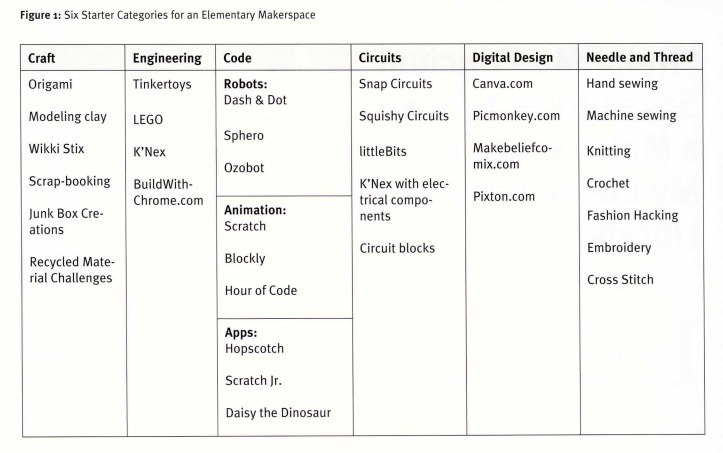
Maker Mondays at Guiteras Library
"Making is an inquiry-driven social activity that allows students to develop the very same skills, dispositions, responsibilities, and strategies touted in the AASL's 21st Century Standards. It opens the library to students who want to acquire, use, and share information in ways other than book-discussion groups or research writing.
Makers are people who make things rather than simply use them. They apply digital and manual skills to solve problems and create items that address their needs. Makers are problem solvers, idea dreamers; they tinker, hack, and customize products and materials to better serve them. Makers live out lifelong learning. They see a problem, something that isn't working for them, and they research ways to solve the problem and experiment, pushing the limits until they are satisfied."
Source: CANINO-FLUIT, ANA. "School Library Makerspaces." Teacher Librarian 41.5 (2014): 21-27. Academic Search Elite. Web. 5 Nov. 2016.

Source: Fontichiaro, Kristin. "Help! My Principal Says I Need To Start A Makerspace In My Elementary Library!." Teacher Librarian 44.1 (2016): 49-51. Academic Search Elite. Web. 5 Nov. 2016.

Maker Mondays Standards Alignment
AASL: 1.1.6, 1.1.6,3.1.2,3.2.1 CCSS.ELA-Literacy.CCRA.R.7 CCSS.ELA-Literacy.CCRA.SL.2 CCSS.ELA-Literacy.CCRA.SL.4
b. will be introduced to the library's collection of how-to-books, coding books, and online resources such as DIY.org and Instructables.com to identify the kind of projects they would like to pursue Connected standards:
AASL: 1.1.1, 2.1.1, 4.1.4, 4.1.5, 4.1.7, 4.4.1 CCSS.ELA-Literacy. CCRA.SL.2
c. will independently read informational texts in a variety of formats to gain knowledge necessary to complete their maker projects
Connected standards:
AASL: 1.1.1, 1.1.3, 1.1.4, 1.1.5, 1.2.1, 1.2.2,4.2.1, 4.2.2. CCSS.ELA-Literacy.CCRA.R.9 CCSS.ELA-Literacy.CCRA.R. 10
d. will be able work on projects in the library during Maker Mondays Connected standards:
AASL: 1.1.2, 1.2.3, 2.1.6, 3.3.4, 4.1.8
e. will share progress reports, seek assistance, give each other project feedback, and collaborate on projects Connected standards:
AASL: 1.2.5, 2.1.3,2.1.5, 3.1.2, 3.2.2, 3.2.3, 3.3.1, 4.4.2 CCSS.ELA-Literacy.CCRA.SL.5
f. will present and explain their projects and making process at the maker showcase and at Maker Mondays Connected standards:
AASL: 2.2.4, 2.3.1, 3.1.1., 3.2.1., 3.3.2, 3.3.5, 3.4.1, 4.3.1, 4.4.5, 4.4.6 CCSS.ELA-Literacy.CCRA.SL.4 CCSS.ELA-Literacy.CCRA.SL.5
1. Inquire, think critically, and gain knowledge.
Share knowledge and participate ethically and productively as members of our democratic society.
Pursue personal and aesthetic growth.
American Association of School Librarians. Standards for the 21st-century Learner in Action. Chicago, IL: Author, 2009.
CCSS.ELA-Literacy.CCRA.SL.1: Prepare for and participate effectively in a range of conversations and collaborations with diverse partners, building on others' ideas and expressing their own clearly and persuasively.
CCSS.ELA-Literacy.CCRA.SL.2: Integrate and evaluate information presented in diverse media and formats, including visually, quantitatively, and orally.
CCSS.ELA-Literacy.CCRA.SL.4: Present information, findings, and supporting evidence such that listeners can follow the line of reasoning and the organization, development, and style are appropriate to task, purpose, and audience.
CCSS.ELA-Literacy.CCRA.SL.5: Make strategic use of digital media and visual displays of data to express information and enhance understanding of presentations.
*Adapted from CANINO-FLUIT, ANA. "School Library Makerspaces." Teacher Librarian 41.5 (2014): 21-27. Academic Search Elite. Web. 5 Nov. 2016.